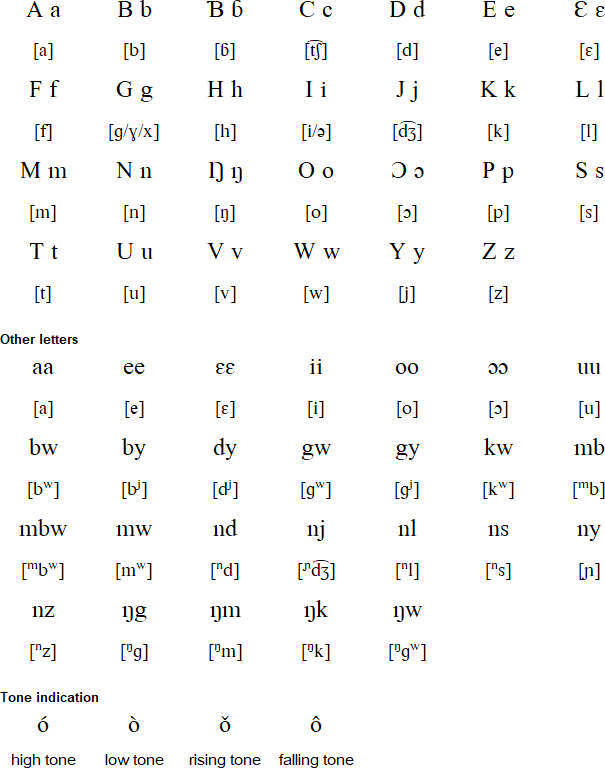Kogo is a Bantu language spoken by about 50,000 people in southern Cameroon. In particular, it is spoken in the departments of Moungo, Nkam, Sanaga-Maritime and Wouri in the Littoral Region, and in the Océan Department in the Southern Region. There are also speakers in the Central and South West Regions, and some in the northwest of Equatorial Guinea.
Kogo is also known as Bakoko or Basoo. Dialects include North Kogo, South Kogo, Adiá, Yakalag, Yasug, Yapoma, Yabyan-Yapeke, Dimbamban and Bisóo. The people who speak it are known as Bakoko, and call themselves Elog-Mpoo. It is closely related to Basaa.
In Cameroon, Kogo is written with a version of the Latin alphabet based on the General Alphabet of Cameroon Languages, which was created in the 1970s. A slightly different spelling system is used by speakers of the Basek dialect in Equatorial Guinea.

Download an alphabet chart for Kogo (Excel)
Mìndiga wa à ɓɛɛ la ɓɔn ɓìŋhaa, àwanda aɓaa là Ŋgɔ̀n ya. Ɓi ɓɛɛ nyàghanɛ a lɛ̀kɛ̀ li ènɛ̀ŋɛ a lìaa li mindìm.
Nyɔ mìndiga ɔ̀ som ndɛg èsaamà, ɔ̀ ti yɔ ɓɔn ɓɛɛ anyuu lìaa li mindìm. Ɛ̀nɛ ŋgoŋo vini, ɓa ɓɔn bu kɛ là ndɛg yaɓa a lìaa li mindìm. Mɔn sig à ɓɛɛ là ndɛg eɓaa.
A woman had three children: two boys and one girl. They had to fetch water from very far away. So this woman bought six calabashes to give to the children to use in fetching water.
In the evening, the children took the calabashes and went to fetch water. Each child had two calabashes. They went to fetch the water carrying one calabash on their head and holding the other one in their hand.
Source: Bakoko orthography guide. Stephen C. Anderson & Mathaus Njeck. 2010.
Information about Kogo | Numbers
Information about Kogo
https://en.wikipedia.org/wiki/Kogo_language
https://fr.wikipedia.org/wiki/Bakoko_(langue)
http://www.language-archives.org/language/bkh
https://www.sil.org/resources/search/language/bkh
https://glottolog.org/resource/languoid/id/bako1249
https://www.sil.org/resources/search/language/bkh
Aka, Aushi, Bafaw-Balong, Bangi, Bangubangu, Basaa, Bemba, Bembe, Bena, Benga, Bhaca, Bila, Bube, Budu, Bujeba, Bukusu, Bulu, Bushong, Central Kilimanjaro, Central Teke, Chichewa, Chokwe, Chopi, Chuwabu, Comorian, Dciriku, Digo, Duala, Eton, Ewondo, Fang, Fuliiru, Fwe, Ganda/Luganda, Giryama, Gogo, Gungu, Gusii, Gwere, Gyele, Ha, Haya, Hehe, Herero, Ibinda, Idaxo-Isuxa-Tiriki, Ikizu, Ikoma, Jita, Kabwa, Kako, Kalanga, Kamba, Kanyok, Kgalagadi, Kiga, Kikuyu, Kimbundu, Kinyarwanda, Kirundi, Kisi, Kobo, Kogo, Komo, Kongo, Konjo, Koti, Kuhane, Kukuya, Kunda, Kuria, Kwambi, Kwangali, Kwasio, Lambya, Lega, Lengola, Lingala, Loma, Lomwe, Lozi, Luba-Katanga, Luchazi, Lunda, Luvale, Luyana, Makaa, Makonde, Makhuwa, Mandekan, Maore, Masaaba, Mbama, Mbere, Mbosi, Mbugu, Mbukushu, Mbunda, Mbuun, Mende, Mongo, Mpiemo, Mushungulu, Mwani, Myene, Nambya, Nande, Ndau, Ndonga, Ngoni, Ngwii, Njebi, Nkore, North Teke, Northern Ndebele (South Africa), Northern Ndebele (Zimbabwe), Northern Sotho, Nyamwezi, Nyakyusa, Nyemba, Nyole, Nyoro, Nyungwe, Nzadi, Oroko, OshiWambo, Pagibete, Pare, Phuthi, Punu, Rangi, Ronga, Safwa, Seki, Sena, Sengele, Shambala, Shona, Soga, Songe, Southern Ndebele, Southern Sotho, Suba, Sukuma, Swahili, Swati, Taita, Talinga, Tanga, Tembo, Tetela, Tonga, Tongwe, Tooro, Tshiluba, Tsonga, Tswa, Tswana, Tumbuka, Turu, Umbundu, Venda, Vili, Vwanji, Wanzi, West Teke, Xhosa, Yakam, Yansi, Yao, Yasa, Yeyi, Zigula, Zinza, Zulu
Languages written with the Latin alphabet
Page created: 17.12.24. Last modified: 18.12.24
[top]
You can support this site by Buying Me A Coffee, and if you like what you see on this page, you can use the buttons below to share it with people you know.

If you like this site and find it useful, you can support it by making a donation via PayPal or Patreon, or by contributing in other ways. Omniglot is how I make my living.
Note: all links on this site to Amazon.com, Amazon.co.uk
and Amazon.fr
are affiliate links. This means I earn a commission if you click on any of them and buy something. So by clicking on these links you can help to support this site.
[top]